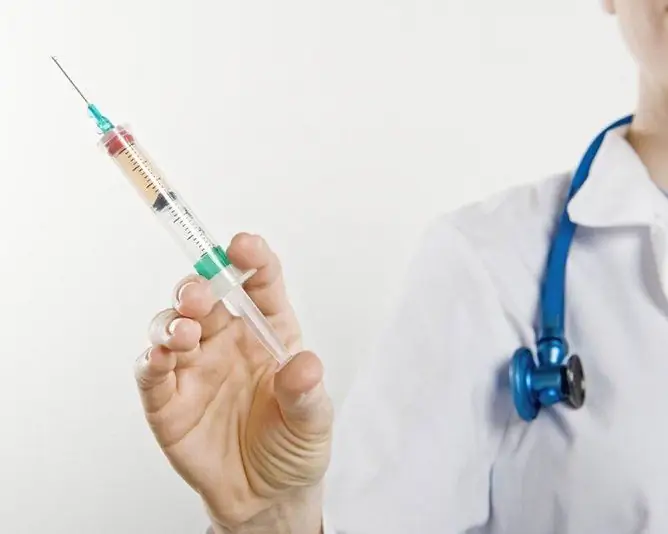- Author Rachel Wainwright wainwright@abchealthonline.com.
- Public 2023-12-15 07:39.
- Last modified 2025-11-02 20:14.
GenITRON
GenITRON: instructions for use and reviews
- 1. Release form and composition
- 2. Pharmacological properties
- 3. Indications for use
- 4. Contraindications
- 5. Method of application and dosage
- 6. Side effects
- 7. Overdose
- 8. Special instructions
- 9. Application during pregnancy and lactation
- 10. Use in childhood
- 11. In case of impaired renal function
- 12. For violations of liver function
- 13. Use in the elderly
- 14. Drug interactions
- 15. Analogs
- 16. Terms and conditions of storage
- 17. Terms of dispensing from pharmacies
- 18. Reviews
- 19. Price in pharmacies
Latin name: Genytron
ATX code: M01AC06
Active ingredient: meloxicam (meloxicam)
Producer: Farmak, PJSC (Ukraine)
Description and photo update: 2018-27-11
Prices in pharmacies: from 194 rubles.
Buy

GenITRON is a non-steroidal anti-inflammatory drug that has anti-inflammatory, analgesic, inhibiting COX (cyclooxygenase), antipyretic effect.
Release form and composition
Dosage forms:
- tablets: yellow, flat-cylindrical, round, with a chamfer and a dividing line, marbling on the surface is allowed (10 pcs. in blisters, in a cardboard box 1 or 2 blisters);
- solution for intramuscular (i / m) administration: transparent liquid of yellow or greenish-yellow color (1.5 ml in glass ampoules without color: in a cardboard box 5 ampoules; 3 or 5 ampoules in a blister, in a cardboard box 1 blister) …
Each pack also contains instructions for using GenITRON.
1 tablet contains:
- active substance: meloxicam - 7.5 mg or 15 mg;
- auxiliary components: microcrystalline cellulose (101), lactose monohydrate (200), sodium citrate, colloidal silicon dioxide (aerosil), povidone (K-17), magnesium stearate, crospovidone.
1 ml of solution contains:
- active substance: meloxicam - 10 mg;
- auxiliary components: sodium chloride, meglumine (N-methylglucamine), poloxamer 188, glycine, tetrahydrofurfuril macrogol (glycofurol), 0.1M sodium hydroxide solution, water for injection.
Pharmacological properties
Pharmacodynamics
GENITRON is a non-steroidal anti-inflammatory drug (NSAID), a COX inhibitor, has analgesic and antipyretic effects. The active substance - meloxicam, is a derivative of enolic acid, has a pronounced anti-inflammatory effect on all standard models of inflammation. The mechanism of its action is due to the ability to inhibit the synthesis of prostaglandins (inflammatory mediators) by selectively suppressing the enzymatic activity of COX-2. The selectivity of COX-2 inhibition decreases with the appointment of GenITRON in high doses and long-term use. In addition, it depends on the individual characteristics of the organism.
In vivo, meloxicam inhibits prostaglandin synthesis at the site of inflammation to a greater extent than in the gastric mucosa or kidneys. This is due to the selective inhibition of COX-2, which provides the therapeutic effect of NSAIDs. Its advantage is that inhibition of the persistent COX-1 isoenzyme is a common cause of gastric and renal adverse effects.
The selective ability of meloxicam to inhibit COX-2 has been confirmed by the results of in vitro and in vivo studies in various test systems.
It was found that at a dose of 7.5 mg or 15 mg meloxicam inhibited COX-2 more actively, exerting a predominant effect on the production of prostaglandin E2 than on the production of thromboxane, a reaction controlled by COX-1. In ex vivo studies, it was found that at a dose of 7.5 mg or 15 mg, meloxicam does not affect platelet aggregation and bleeding time.
Pharmacokinetics
After oral administration, absorption of meloxicam from the gastrointestinal tract occurs almost completely, its absolute bioavailability is 90%. The degree of absorption with the simultaneous intake of food and antacids does not change. The maximum concentration (C max) of meloxicam in plasma is reached after 5-6 hours, it is dose-dependent. The equilibrium concentration (C ss) in plasma occurs within 72-120 hours.
The bioavailability of meloxicam when administered intramuscularly is about 100%. After administration at a dose of 15 mg, its C max in plasma is reached after about 1 hour.
Plasma protein binding (mainly albumin) - 99%.
Overcomes histohematogenous barriers. Its concentration in the synovial fluid reaches 50% of the plasma concentration.
The volume of distribution (V d) after oral administration is approximately 16 liters, in / m administration - 11 liters.
Meloxicam is metabolized in the liver almost completely with the formation of four pharmacologically inactive metabolites. The conversion process occurs as a result of peroxidase oxidation and with the participation of isoenzymes CYP2C9 and CYP3A4.
The half-life (T 1/2) can range from 13 to 25 hours, with intramuscular administration - 20 hours. Plasma clearance after a single dose is 7-12 ml / min, intramuscular injection - 8 ml / min.
Up to 5% of the daily dose is excreted through the intestines unchanged, the rest - in the form of metabolites equally through the intestines and kidneys.
The pharmacokinetics of meloxicam in case of impaired liver function or mild to moderate renal failure does not change significantly. With renal failure of moderate severity, the rate of elimination of meloxicam from the body increases.
In patients with end-stage renal failure, the binding of the active substance to plasma proteins worsens, V d increases, therefore it is recommended to use GenITRON in a daily dose not exceeding 7.5 mg.
Pharmacokinetic parameters in elderly patients do not change. They have slightly lower mean plasma clearance at steady state than younger patients.
In elderly women, the total concentration of meloxicam in the blood plasma and T 1/2 increase compared with patients of both sexes.
Indications for use
The use of GenITRON is indicated for short-term symptomatic therapy in order to reduce inflammation and pain at the time of use in the following conditions:
- osteoarthritis (degenerative diseases of the joints, arthrosis), including accompanied by pain syndrome;
- ankylosing spondylitis (ankylosing spondylitis);
- rheumatoid arthritis.
GenITRON has no effect on the progression of the disease.
Contraindications
- incomplete or complete combination of bronchial asthma, intolerance to acetylsalicylic acid and other NSAIDs, angioedema or urticaria, recurrent polyposis of the nose and paranasal sinuses (including history);
- stage of exacerbation of erosive and ulcerative lesions of the mucous membrane of the stomach and duodenum (or recently transferred);
- active gastrointestinal bleeding;
- inflammatory bowel diseases: Crohn's disease, ulcerative colitis in the acute stage;
- active liver disease, severe liver failure;
- progressive kidney disease;
- severe renal failure with creatinine clearance (CC) less than 30 ml / min (in patients with confirmed hyperkalemia, not undergoing hemodialysis);
- recently transferred cerebrovascular bleeding;
- diseases of the blood coagulation system;
- decompensated heart failure;
- acute myocardial infarction;
- period after coronary artery bypass grafting;
- period of pregnancy;
- breast-feeding;
- hypersensitivity to other NSAIDs;
- individual intolerance to the components of GenITRON.
Age contraindications:
- tablets: up to 12 years old;
- solution for intramuscular injection: up to 18 years.
In addition, pills should not be prescribed to patients with hereditary lactose intolerance, lactase deficiency, impaired absorption of glucose and galactose, as well as thyroid diseases.
Care should be taken when prescribing GenITRON to patients with a history of gastric ulcer and duodenal ulcer or liver disease, in the presence of Helicobacter pylori infection, in severe somatic diseases, cerebrovascular disorders, chronic heart failure, coronary artery disease, pathologies, peripheral arteries renal failure with CC 30-60 ml / min, dyslipidemia, hyperlipidemia, diabetes mellitus, bronchial asthma, tuberculosis, severe osteoporosis, smoking, alcohol abuse, while taking prednisolone and other oral glucocorticosteroids (GCS), antiplatelet agents (including clopidogrel) anticoagulants (including warfarin), citalopram, paroxetine, sertraline, fluoxetine and other selective serotonin reuptake inhibitors,in case of prolonged use of NSAIDs, elderly patients.
GENITRON, instructions for use: method and dosage
Pills
GenITRON tablets are taken orally, swallowing whole, with meals.
Recommended daily dosage:
- osteoarthritis: 7.5 mg, in the absence of the desired effect, the dose can be increased to 15 mg;
- rheumatoid arthritis: 15 mg, after achieving positive dynamics, the dose can be reduced to 7.5 mg;
- ankylosing spondylitis: initial therapy - 15 mg, after achieving a therapeutic effect, you can switch to 7.5 mg.
For the treatment of patients with an increased risk of developing adverse reactions, the initial daily dose should not exceed 7.5 mg.
The doctor sets the duration of the course individually, taking into account the severity of the disease and the effect of the therapy.
For the treatment of patients with severe renal insufficiency who are on hemodialysis, a dose of not more than 7.5 mg per day should be used. In case of mild and moderate renal failure (CC more than 30 ml / min), GenITRON dose adjustment is not required.
For the treatment of patients with compensated cirrhosis, the usual dosing regimen is used.
Solution for i / m administration
GENITRON injections are injected deeply intramuscularly.
Do not administer the solution intravenously!
IM administration of meloxicam is indicated as an initial therapy only for 2-3 days, then the patient is transferred to taking pills.
The doctor prescribes the daily dose of GenITRON taking into account the intensity of the pain syndrome and the severity of the inflammatory process.
The recommended dosage is 7.5 mg (0.75 ml) or 15 mg (1.5 ml) once a day. The maximum daily dose is 15 mg (1.5 ml).
Do not mix meloxicam in the same syringe with other drugs to prevent possible incompatibility.
With an increased risk of adverse reactions, including in patients with severe renal failure on hemodialysis, the daily dose should not exceed 7.5 mg of meloxicam.
With mild or moderate renal failure (CC more than 30 ml / min), dose adjustment of GenITRON injections is not required.
Concomitant use with other NSAIDs is contraindicated.
In the case of the simultaneous use of meloxicam in the form of tablets, suppositories, oral suspension or solution, its total daily dose should not exceed 15 mg.
Side effects
- from the hematopoietic system: infrequently - anemia; rarely - leukopenia, thrombocytopenia, changes in the leukocyte formula and the number of blood cells;
- mental disorders: often - emotional lability; frequency not established - disorientation, confusion;
- from the nervous system: often - headache; infrequently - drowsiness, dizziness;
- from the digestive system: often - abdominal pain, nausea, vomiting, dyspepsia, diarrhea; infrequently - stomatitis, gastritis, constipation, belching, bloating, gastrointestinal bleeding (established or latent, including fatal); rarely - esophagitis, gastroduodenal ulcer, colitis; very rarely - perforation of the gastrointestinal tract (GIT), including with a fatal outcome;
- from the hepatobiliary system: infrequently - an increase in transaminase activity, an increase in bilirubin, other transient changes in liver function indicators; very rarely - hepatitis;
- on the part of the cardiovascular system: infrequently - increased blood pressure (BP), rush of blood to the skin of the face; rarely - palpitations;
- on the part of the organ of hearing: infrequently - vertigo; rarely - tinnitus;
- on the part of the organ of vision: rarely - conjunctivitis, blurred vision and other visual impairments;
- dermatological reactions: infrequently - itching, rash, angioedema; rarely - urticaria, Stevens-Johnson syndrome, toxic epidermal necrolysis; very rarely - erythema multiforme, bullous dermatitis; frequency not established - photosensitivity;
- on the part of the immune system: the frequency has not been established - hypersensitivity reactions, including anaphylactic shock, anaphylactoid and / or anaphylactic reactions;
- from the urinary system: infrequently - an increase in the concentration of urea and / or creatinine in the blood serum, acute urinary retention and other urinary disorders; very rarely - acute renal failure; possibly - interstitial nephritis, renal medullary necrosis, glomerulonephritis, nephrotic syndrome;
- on the part of the respiratory system: rarely - bronchial asthma with individual intolerance to acetylsalicylic acid or NSAIDs;
- local reactions: swelling and pain at the injection site;
- others: often - peripheral edema.
Overdose
Symptoms: epigastric pain, nausea, vomiting, drowsiness, impaired consciousness, gastrointestinal bleeding, liver failure, acute renal failure, hypertension, arterial hypotension, asystole, respiratory arrest.
Treatment: there is no specific antidote, symptomatic therapy is prescribed. In case of an overdose of GenITRON in the form of tablets, immediate gastric lavage, intake of activated charcoal is indicated. The use of forced diuresis, urine alkalization or hemodialysis is ineffective.
special instructions
The development of severe side effects from the gastrointestinal tract can be prevented by using GenITRON in the minimum effective dose for a short course.
Patients with gastrointestinal pathologies require regular examinations. It should be borne in mind that at any stage of drug use, potentially fatal gastrointestinal bleeding, ulcers or perforation may occur, including in patients without a history of severe gastrointestinal diseases. If ulceration of the gastrointestinal tract or gastrointestinal bleeding is detected, the use of GenITRON should be discontinued. Particular care should be taken when treating elderly patients.
In case of cardiovascular diseases or in patients with risk factors for their development, the risk of serious cardiovascular thrombotic events, angina pectoris attack, myocardial infarction and stroke, including fatal ones, increases.
GENITRON can increase the retention of water, sodium, potassium and reduce the natriuretic effects of diuretics. In patients with heart failure or hypertension, patients should be tested for renal function before starting treatment, ensure that adequate hydration is maintained, and that clinical monitoring is performed.
Patients with dehydration, chronic heart failure, cirrhosis of the liver, nephrotic syndrome, chronic kidney disease who are on concomitant therapy with diuretics, angiotensin II receptor antagonists or angiotensin converting enzyme (ACE) inhibitors interventions), in old age. Therefore, in such patients it is necessary to monitor the urine output and the state of renal function before starting the use of GenITRON.
In case of a significant and persistent deviation from the norm in the indicators of transaminase activity or other indicators of liver function, treatment should be canceled, followed by control tests.
When using GenITRON, the ability of NSAIDs to mask the symptoms of infectious diseases should be taken into account.
When the first signs of hypersensitivity appear (skin rashes, mucosal lesions), immediate withdrawal of the drug is required.
Influence on the ability to drive vehicles and complex mechanisms
GenITRON can cause side reactions from the nervous system, therefore it is recommended to avoid potentially hazardous activities, including driving, during the period of drug use.
Application during pregnancy and lactation
The use of GenITRON during gestation and lactation is contraindicated.
Meloxicam is not recommended for women who are planning to conceive, it can affect fertility, cause a delay in ovulation.
Pediatric use
Age contraindications:
- tablets: up to 12 years old;
- solution for intramuscular injection: up to 18 years.
With impaired renal function
You can not use GenITRON in progressive kidney disease, for the treatment of patients with confirmed hyperkalemia, not undergoing hemodialysis, with severe renal failure (CC less than 30 ml / min).
Precautions should be taken in renal failure with CC 30-60 ml / min.
For violations of liver function
The appointment of GenITRON is contraindicated in patients with active liver disease or severe hepatic insufficiency.
No dose adjustment is required in compensated liver cirrhosis.
Use in the elderly
Care should be taken when prescribing NSAIDs in elderly patients.
Drug interactions
With the simultaneous use of GenITRON:
- salicylates, corticosteroids and other inhibitors of prostaglandin synthesis: there is a synergism of action and an increased risk of ulceration of the gastrointestinal tract mucosa (gastrointestinal tract) and gastrointestinal bleeding;
- anticoagulants, heparin for systemic use, thrombolytics: the likelihood of bleeding increases. If it is necessary to use this combination, it is necessary to monitor the indicators of the blood coagulation system;
- antiplatelet agents, serotonin reuptake inhibitors: inhibit platelet function, increase the risk of bleeding;
- lithium preparations: a significant decrease in renal excretion of lithium is possible, causing an increase in its concentration in the blood plasma until the toxicity level is reached, therefore, the combination of meloxicam with lithium preparations should be avoided;
- methotrexate: there is a decrease in renal excretion of methotrexate, which leads to an increase in its concentration in plasma. Therefore, if it is necessary to prescribe this combination, the weekly dose of methotrexate should not exceed 15 mg; careful monitoring of the functional state of the kidneys and blood counts is also required. The risk of increased hematological toxicity of methotrexate and other drugs that cause bone marrow suppression increases with impaired renal function, cytopenia may develop;
- intrauterine contraceptives: it is possible to reduce the contraceptive effect of intrauterine contraceptives;
- diuretics: increase the risk of acute renal failure;
- antihypertensive drugs: against the background of inhibition of prostaglandins, the therapeutic effect of ACE inhibitors, beta-blockers, vasodilators and diuretics decreases;
- angiotensin II receptor antagonists, ACE inhibitors: there is a synergism of action that reduces glomerular filtration. With impaired renal function, the risk of developing acute renal failure increases;
- cholestyramine: promotes faster elimination of meloxicam;
- cyclosporine: increased nephrotoxicity of cyclosporine;
- oral hypoglycemic agents: can enhance their therapeutic effect, increasing the risk of hypoglycemia;
- digoxin, cortisone, diuretics: may weaken their effect;
- drugs that can inhibit CYP2C9 and / or CYP3A4, or metabolized with the participation of these isoenzymes: may cause pharmacokinetic interactions with meloxicam;
- antacids, cimetidine, digoxin, furosemide: no pharmacokinetic interaction with these agents has been established.
Analogs
GenITRON analogs are: Meloxicam, Amelotex, Artrozan, B-ksikam, Flexibon, Mirlox, Mataren, Melbek, Movalis, Oksikamoks.
Terms and conditions of storage
Keep out of the reach of children.
Store at temperatures up to 25 ° C in a dark place.
The shelf life is 3 years.
Terms of dispensing from pharmacies
Dispensed by prescription.
Reviews about GenITRON
Reviews of GenITRON from patients and specialists are currently absent.
Price for GenITRON in pharmacies
The price of GenITRON for a package containing 20 tablets at a dose of 7.5 mg can be from 177 rubles, at a dose of 15 mg - from 293 rubles, for 3 ampoules of solution for i / m administration - from 356 rubles, for 5 ampoules - from 553 rubles.
GENITRON: prices in online pharmacies
|
Drug name Price Pharmacy |
|
Genitron 7.5 mg tablets 20 pcs. 194 r Buy |
|
Genitron 15 mg tablets 20 pcs. 265 RUB Buy |
|
Genitron 10 mg / ml solution for intramuscular injection 1.5 ml 3 pcs. 302 RUB Buy |
|
Genitron solution for intramuscular injection 10mg / ml ampoules 1.5ml 5 pcs. 544 r Buy |
|
Genitron 10 mg / ml solution for intramuscular injection 1.5 ml 5 pcs. 544 r Buy |

Anna Kozlova Medical journalist About the author
Education: Rostov State Medical University, specialty "General Medicine".
Information about the drug is generalized, provided for informational purposes only and does not replace the official instructions. Self-medication is hazardous to health!






